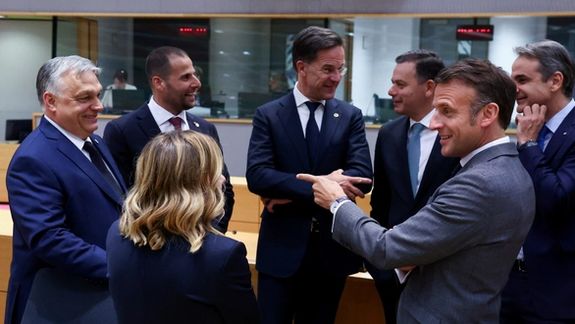EU Members Plan More Sanctions Against Iran

European Union leaders decided on Wednesday to step up sanctions against Iran after Tehran's recent attack on Israel left world powers scrambling to prevent a wider conflict in the Middle East.

European Union leaders decided on Wednesday to step up sanctions against Iran after Tehran's recent attack on Israel left world powers scrambling to prevent a wider conflict in the Middle East.
The two-day summit in Brussels is the first meeting of the EU's 27 national leaders since Saturday's attack, more than six months into the war between Israel and the Iran-backed Palestinian militant group Hamas.
Israel has signaled that it will retaliate but has not said how. The EU has urged Israel to exercise restraint while expressing readiness to tighten sanctions on Tehran.
"We have to adjust, to expand them (the sanctions) on Iran," French President Emmanuel Macron said in Brussels ahead of the summit.
"We are in favor of sanctions that can also target all those who help manufacture drones and missiles that were used in the attacks last Saturday and Sunday."
In the coming days, the US will also impose sanctions on Iran's missile and drone programs, as well as on entities that support the Islamic Revolutionary Guard Corps (IRGC), and the Defense Ministry, according to Jake Sullivan, the National Security Adviser at the White House.
German Chancellor Olaf Scholz said it was important that Israel "does not respond with a massive attack of its own".
The leaders will condemn the Iranian attack, reaffirm their commitment to Israel's security and call on all sides to prevent more tensions, including in Lebanon, according to a draft statement seen by Reuters.
"The EU is ready to take further restrictive measures against Iran, notably in relation to unmanned aerial vehicles (UAVs) and missiles," said the statement.
Italy spoke separately ahead of G7 talks in favor of sanctions against those who supplied arms for the attack against Israel, as well as those behind attacks on ships in the Red Sea.
Iran launched the attack on Saturday in response to an April 1 strike on a building adjacent to its embassy in Damascus which it blamed on Israel. Two IRGC generals and five senior officers meeting in the building were killed. Tel Aviv launched its military offensive in Gaza after Hamas' deadly attack on Israel on October 7.
EU Divisions
The war in Gaza has exposed differences between EU countries, with some siding more with Israel and others more strongly criticizing its conduct while highlighting the dire humanitarian situation in the Palestinian enclave.
Several EU states have proposed expanding a sanctions scheme that seeks to curb the supply of Iranian drones to Russia for Moscow's war in Ukraine to include the provision of missiles and cover deliveries to Iranian proxies in the Middle East.
Belgian Prime Minister Alexander De Croo backed introducing sanctions against Iran's Revolutionary Guard Corps but Scholz said that required further legal checks.
On Tuesday, EU's top diplomat said the bloc's rules meant that could only happen if a national authority in the EU found that the group had been involved in terrorist activity.
Based on political decisions at the summit, EU foreign ministers are due to continue the sanctions work next Monday.
The United States and other Western governments hope new sanctions against Iran will help persuade Israel to limit its retaliation. Analysts say, however, Iran is unlikely to face severe punishment because of worries about boosting oil prices in a US election year.
With reporting by Reuters